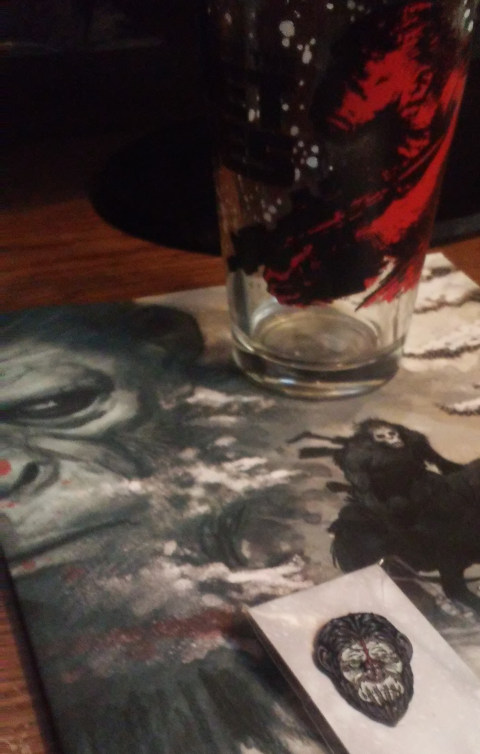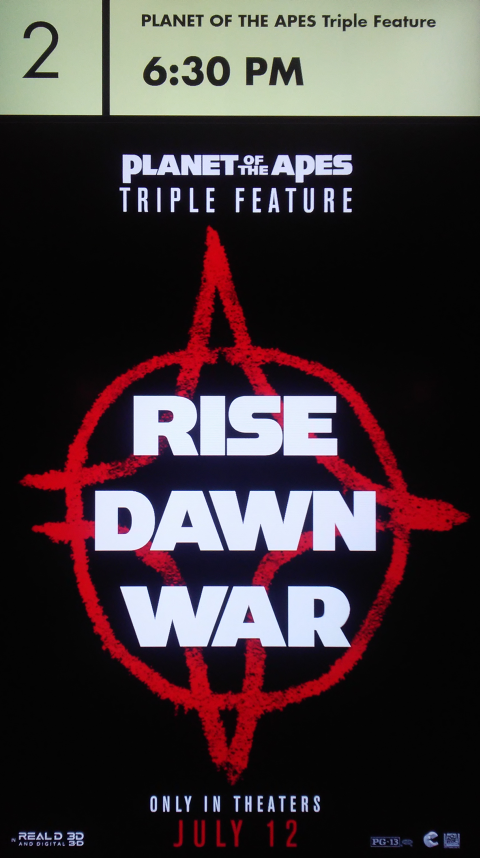
None of this should have worked.
The original 1968 Planet of the Apes movie is a total classic, and Lord knows it was followed up by many a sequel of, shall we way, differing quality. Not to mention that epic fail of a remake in 2001.
So why reboot the franchise with a prequel (of all things) more than forty years after the original film?
I don’t know. I still don’t know. But I’m glad they did it.
“They” in this case being husband and wife super-team Rick Jaffa and Amanda Silver, who wrote and produced the first of these new films, and who have remained on as guiding hands (to say the least) ever since. Whereas so many reboots/remakes/sequels/prequels/re-imaginings/etc. feel like cynical cash grabs, the Jaffa/Silver Apes movies seem to have a passion for the material that shines through, and I think a lot of that is owed to Rick and Amanda.
I’ve said it before; I’ll say it again. These films are the paragon of “movies that nobody wanted or needed, but we’re getting them anyway.” They are well-executed, emotionally moving works of art, but even beyond that, they are pushing the envelope of filmmaking.
Historically, I’m an anti-CGI guy, and I still very much am when the practical will look better, but, in the case of these films, what they’ve been able to do with motion capture technology and digital rendering is beyond outstanding; though, of course, without quality writing, I don’t know how much it would matter, but I digress.
Let’s get to it.
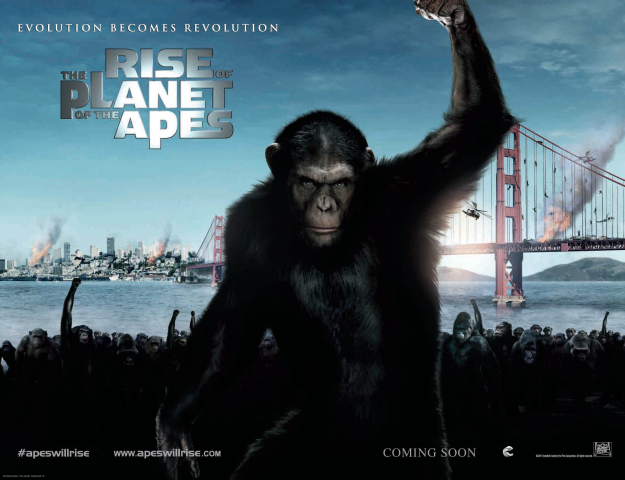
Directed by Rupert Wyatt
Written by Rick Jaffa & Amanda Silver
Cast: Andy Serkis, Karin Konoval, Terry Notary, Richard Ridings, Christopher Gordon, Devyn Dalton, Jay Caputo, James Franco, Freida Pinto, John Lithgow, Brian Cox, Tom Felton, David Oyelowo, Tyler Labine, Ty Olsson, James Pizzinato, Dean Redman, Sandy Robson, Timothy Webber
Soundtrack: Patrick Doyle
To think this all started with just one ape…
We weren’t quite ready for this back in 2011 (I know I missed it for sure).
Not that Rise of the Planet of the Apes (or ROTPOTA, as it’s often abbreviated) didn’t do well at the box office (it was actually right in line with the major superhero releases of the year, which is impressive), but I think most people were so caught up with “OMG, CGI MONKEYS” that a lot of actual film criticism went out the window.
I say all this because, upon further review, Rise of the Planet of the Apes is nearly perfect. It’s a film that thrives on the “show, don’t tell” philosophy, using visual storytelling as a means of both exposition and character development in order to move us through a rather sprawling plot (in terms of passage of time) at an expeditious but not overwhelming pace. In different hands, this movie easily could have been two and a half hours long, completely bloated, and needlessly bogged down in the details (and/or unmotivated action schlock), but Rupert Wyatt and company knew well enough to keep things moving. I’m not saying all of the logic is flawless, but it’s more-than-acceptable movie logic.
In terms of the cast, I’m not the biggest James Franco fan in general, but I think he does just fine here, and that’s largely true of everybody else (especially John Lithgow, who, range-wise, has the most to do). If I have one minor criticism, it’s that a few of the more antagonistic characters are maybe just a touch too arch, but there’s nothing that’ll take you completely out of the movie. By-and-large, everybody feels pretty real.
Of course, the true stars (of all of these movies) are the motion capture actors; most notably Andy Serkis as “Caesar”, but I’ll throw in Terry Notary (who’s no one trick ape) as “Rocket” and Karin Konoval (who gets a human cameo in this film) as “Maurice” as well. They’re really the Kirk, Spock, and McCoy of this franchise, and the range of emotion they bring is ultimately what transcends the digital divide to make everything work.
If you haven’t seen Rise, or even if you have, I highly recommend a repeat viewing. The effects have aged slightly in six years (especially compared to the later films), but the story and storytelling still holds up, and it’s eminently entertaining while still packing an emotional punch (I was honestly moved to tears at the end).
Rating: ★★★★½
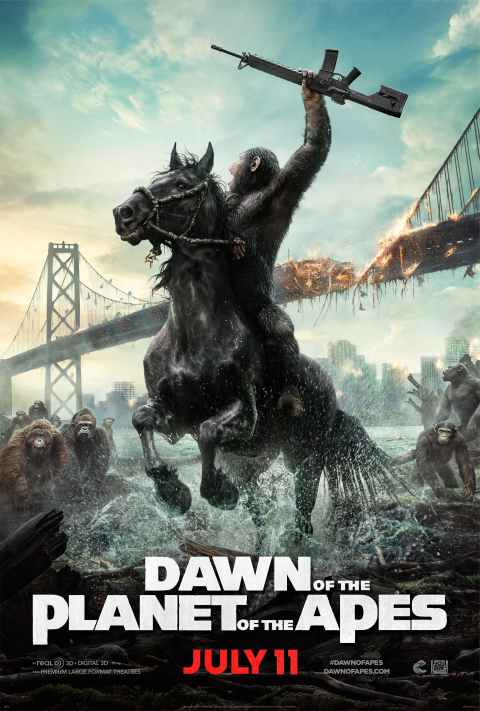
Directed by Matt Reeves
Written by Mark Bomback and Rick Jaffa & Amanda Silver
Cast: Andy Serkis, Jason Clarke, Gary Oldman, Keri Russell, Toby Kebbell, Kodi Smit-McPhee, Kirk Acevedo, Nick Thurston, Terry Notary, Karin Konoval, Judy Greer, Keir O’Donnell, Kevin Rankin
Soundtrack: Michael Giacchino
One of the beauties of the Mad Max series is that you can watch any of them without knowledge of the others, and still understand what’s happening and why. This is also true of these Apes films, and Dawn handles it particularly elegantly (fair to say it’s The Road Warrior to Rise‘s Mad Max, in terms of pre- vs. post-apocalypse).
It’s a shame that Rupert Wyatt, for whatever reason, wan’t able to return to direct after doing such a great job with Rise, but Matt Reeves has proven to be no slouch.
Dawn of the Planet of the Apes (DOTPOTA?) is markedly different from its predecessor, but the high quality is still there (dare I say, some things are better, although it did have nearly double the budget; definitely worth it as it similarly held serve with the big superhero films of the year).
For one thing, it’s much more laconic and slower-paced than Rise, although I’d never say it drags, but, more importantly, the story is much less about constantly connecting the dots and much more about ideals and ethics (and atmosphere), like many great sci-fi stories before it (Kirk, Spock, and McCoy come to mind again). Technically, there are “villains” in this film, but it’s really different points of view at odds, both on the human side and the ape side.
The result is akin to a Shakespearean tragedy, equal parts devastating and beautiful.
One thing I have to commend this film in particular on is the production design. Unless you’re just shooting in a desert wasteland or a forest preserve (as often happened in the Eighties and Nineties), it can be difficult to convey a true sense of post-apocalyptic life, but James Chinuld and his team did a fantastic job, not only with the ape village, but “San Francisco” overrun with vegetation and the ravages of time.
I’d also be remiss if I didn’t mention Michael Giacchino’s score; not that Patrick Doyle did a bad job on Rise, but it definitely has a more generic overall sound whereas Giacchino’s score has more of a classic feel, and also works in elements reminiscent of the original ’68 film (though, again, Dawn had nearly double the budget of Rise, so you have to factor that in).
Again, the motion capture artists bring quality performances, but the human performers stand out a little more in this one (in a good way), especially Gary Oldman as a guy trying to hold an entire colony together, and I’ll give credit to Jason Clarke as well; you really believe his character and why he’s putting his life on the line for the sake of something bigger.
It’s lofty praise, but I’ve seen this film compared to The Empire Strikes Back, and I think that’s fair. It’s certainly an apt comparison in terms of the tones of the second installments relative to the first ones, and taking the stories in different directions. I don’t necessarily rate it higher than the first because I think they’re both equally successful at what they’re trying to accomplish, but, as I’ve mentioned, there’s a bit more polish thanks to the greatly increased budget.
And, yes, I teared up at the end of this one, too.
Highly recommend.
Rating: ★★★★½
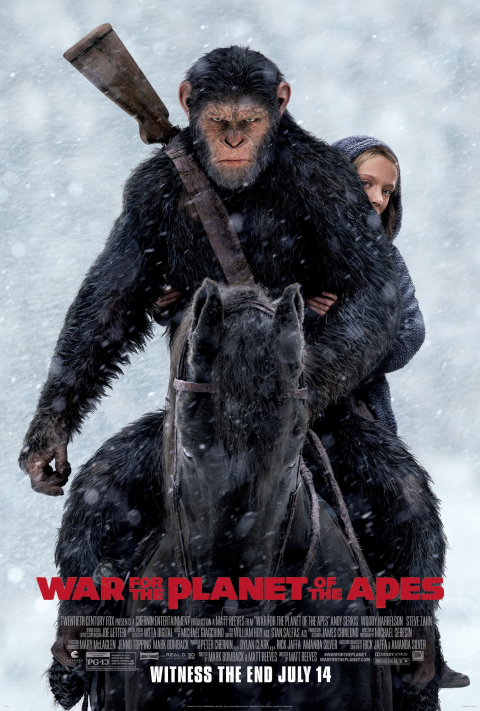
Directed by Matt Reeves
Written by Mark Bomback & Matt Reeves, based on characters created by Rick Jaffa & Amanda Silver
Cast: Andy Serkis, Woody Harrelson, Steve Zahn, Karin Konoval, Amiah Miller, Terry Notary, Ty Olsson, Michael Adamthwaite, Toby Kebbell, Gabriel Chavarria, Judy Greer, Sara Canning, Devyn Dalton, Aleks Paunovic, Alessandro Juliani, Max Lloyd-Jones, Timothy Webber, James Pizzinato, Dean Redman, Sandy Robson
Soundtrack: Michael Giacchino
“And now, the end is near…”
At last, we’ve reached the end of this trilogy (and, I hope, the end of this series, although if it keeps making money they’ll probably keep milking it until I’m dead, like Star Wars).
Right off the bat, I knew I was going to have to take points off from this movie because it does not handle the introductory catch-up as elegantly as its predecessor (title cards as opposed to clever montage). And, at the end, I felt like it was a little longer than it needed to be (although it was very late by that point), so, I just can’t rate War quite as highly as Rise or Dawn.
BUT, this is still a production of exceeding quality (especially the score; I think Michael Giacchino slightly tops himself from the last movie), and one I’d recommend without any qualms.
One last small criticism though, and I normally don’t get into plot elements for new movies, but, just to properly set expectations, I think the title of this film is slightly misleading. Yes, there’s a war on, and everything that happens is in the context of that war, but if you’re expecting a huge chunk of time devoted to battle sequences, this isn’t necessarily that movie (it’s very anti-Hobbit in that regard).
That said, one of the things I most appreciate about this film is that, despite the fact that it stars CGI apes (who at this point look nearly flawless, to be honest), it has the cinematic look and emotional tone of something from even further back than 1968. In fact, and older critics may call me blasphemous for saying this, but I very much got Sam Spiegel-David Lean vibes while watching this (which actually means we’ve come full circle, because The Bridge on the River Kwai was also based on a Pierre Boulle novel). It just has that classic of a feel to it.
Really, there’s not much else that I can say. For a third installment in a series, it’s hard to ask for much more: gorgeous to look at, emotionally engaging, and a story that feels rather timeless.
A fitting conclusion to one of the greatest movie trilogies, certainly of my lifetime, if not all-time. I can only hope more people come to appreciate its brilliance as time goes on.
Rating: ★★★★☆
Just to wrap this all up, all of these movies are strong on their own merit, but they also go the extra mile to throw in references to the original movies from the Sixties and Seventies (usually subtle; usually), which is fun and interesting for the fans.
Again, I can’t say enough how unimaginable it was before these films came out that I’d ever find myself so invested in digitally-created characters in live-action movies, but the effects people at Weta do tremendous work, guided by quality performances from quality actors.
Give this series the keys and it’ll drive your heart.
I don’t know what to tell you if it doesn’t.
P.S.
Thanks to Alamo and Mondo for the incredible merchandise, as usual.